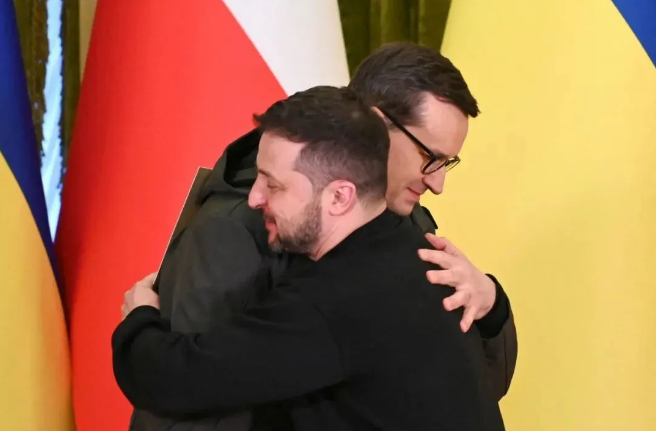By Wang Aoduo

Polish Prime Minister Mateusz Morawiecki (left) meets with Ukrainian President Volodymyr Zelensky (File photo)
As the military conflict between Russia and Ukraine is dragging on, the US White House, Department of Defense (DOD) and Department of State (DOS) have successively conveyed that the country has exhausted the majority of funding intended to support Ukraine, and its state of combat readiness would be compromised should the conflict situation persist. In this context, the US Central Command issued a statement on October 4 saying that the country transferred about 1.1 million 7.62 mm-caliber bullets expropriated from Iran to Ukraine on October 4 to relieve the equipment shortage in the Ukrainian military.
In this regard, Professor Shao Yongling analyzed that the ruling Democratic Party and the Republican Party in the US hold divergent opinions on the issue of military aid to Ukraine. In addition, the American people believe that they should not assist Ukraine as in the past amid the domestic debt crisis and endless refugee problems in the country.
Shao said that despite the increasingly prominent differences and contradictions on this issue within the US, the Biden administration will still stay firm in its stance of continuing military aid to Ukraine in general. The US' delivery of bullets seized from Iran to Ukraine is a signal that the aid will not be interrupted.
Opposition to military aid to Ukraine within Europe is also increasingly vocal. Poland has previously indicated that it will no longer provide military support to Ukraine. Recently, the weariness surrounding this issue has also become evident in Slovakia and Germany. Russian Press Secretary of the President Dmitry Peskov has previously articulated that Western countries including the US and Europe will sooner or later be fed up with supporting Ukraine, leading to internal divisions in the Western countries.
Shao pointed out that this comment from the Russian side is not overblown in the long run. On the issue of military aid to Ukraine, countries like Poland, Hungary and Slovakia have limited capacity to contribute even with full throttle, but could exacerbate the split in the Western camp if they vote against this.
It was also reported that British Secretary of State for Defence Grant Shapps recently disclosed that he had held talks with military leaders of the country around conducting a training program on the British troops inside Ukraine for the first time. But later British Prime Minister Rishi Sunak clarified the matter publicly "What the defence secretary was saying was that it might well be possible one day in the future for us to do some of that training in Ukraine."
According to Shao's analysis of these contradictory statements from the British side, the behaviors of the UK are an attempt to gauge the external response. The country has played a leading role in the Western aid to Ukraine, such as assisting with tanks, training pilots and providing Storm Shadow cruise missiles for the latter.
Shao noted that against the protracted inclination of the conflict, US and Western aid to Ukraine will inevitably evolve into the direction of training military personnel and producing weapons and equipment in Ukraine. More Western countries will position the training of Ukrainian troops in Ukraine in the long term.
The NATO Secretary General and defense ministers of the UK and France stressed the necessity to facilitate arms production in Ukraine during their recent visit to Kyiv. Shao commented that the production capacities of Western military enterprises have already reached their maximum limit, but still fail to meet the needs of Ukraine. Producing weapons in Ukraine, on the one hand, is a behavior of the military enterprises that profit both themselves and the relevant governments. On the other hand, it can also significantly slash costs and streamline equipment maintenance. This type of "localized" aid to Ukraine is a prevailing trajectory and a means to cope with the protracted conflict between Russia and Ukraine for the US and the West.
Editor's note: Originally published on military.cnr.cn, this article is translated from Chinese into English and edited by the China Military Online. The information and opinions in this article do not necessarily reflect the views of eng.chinamil.com.cn.













